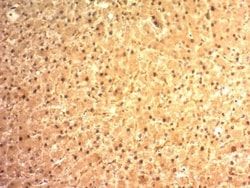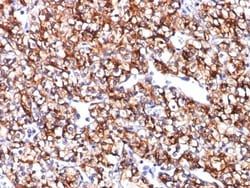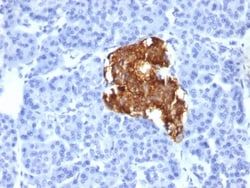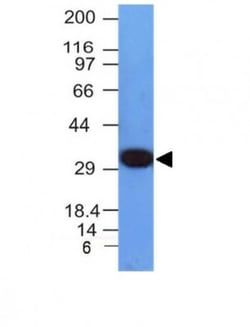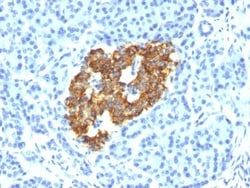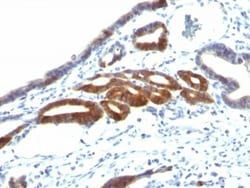Arginase 1/ARG1/liver Arginase Antibody (ARG1/1125), Novus Biologicals™
Mouse Monoclonal Antibody
Manufacturer: Fischer Scientific
The price for this product is unavailable. Please request a quote
Antigen
Arginase 1/ARG1/liver Arginase
Concentration
0.2mg/mL
Applications
Western Blot, Flow Cytometry, Immunohistochemistry (Paraffin), Immunofluorescence
Conjugate
Unconjugated
Host Species
Mouse
Research Discipline
Cancer, Cellular Markers, Chromatin Research, Lipid and Metabolism
Formulation
10mM PBS and 0.05% BSA with 0.05% Sodium Azide
Gene Alias
arginase 1, arginase, liver, arginase-1, EC 3.5.3.1, Liver-type arginase, Type I arginase
Gene Symbols
ARG1
Isotype
IgG3 κ
Purification Method
Protein A or G purified
Test Specificity
Recognizes a protein of 35-38kDa, which is identified as Arginase 1 (ARG1). Arginase is a manganese metallo-enzyme that catalyzes the hydrolysis of arginine to generate ornithine and urea. Arginase I and II are isoenzymes which differ in subcellular localization, regulation, and possibly function. Arginase I is a cytosolic enzyme, which is expressed mainly in the liver as part of the urea cycle, whereas arginase II is a mitochondrial protein found in a variety of tissues. Antibody to ARG-1 labels hepatocytes in normal tissues and granulocytes in peripheral blood. ARG-1 is a sensitive and specific marker for identification of hepatocellular carcinoma.
Clone
ARG1/1125
Dilution
Western Blot 0.5 - 1.0 ug/ml, Flow Cytometry 0.5 - 1 ug/million cells in 0.1 ml, Immunohistochemistry-Paraffin 2 - 4 ug/ml, Immunofluorescence 1 - 2 ug/ml
Classification
Monoclonal
Form
Purified
Regulatory Status
RUO
Target Species
Human
Gene Accession No.
P05089
Gene ID (Entrez)
383
Immunogen
Recombinant fragment (87 Amino acid residues around aa 1-150) of human ARG1 protein
Primary or Secondary
Primary
Content And Storage
Store at 4C.
Molecular Weight of Antigen
36.5 kDa
Description
- Ensure accurate, reproducible results in Western Blot, Flow Cytometry, Immunohistochemistry (Paraffin), Immunofluorescence Arginase 1/ARG1/liver Arginase Monoclonal specifically detects Arginase 1/ARG1/liver Arginase in Human samples
- It is validated for Western Blot, Immunohistochemistry, Immunohistochemistry-Paraffin, Protein Array.
